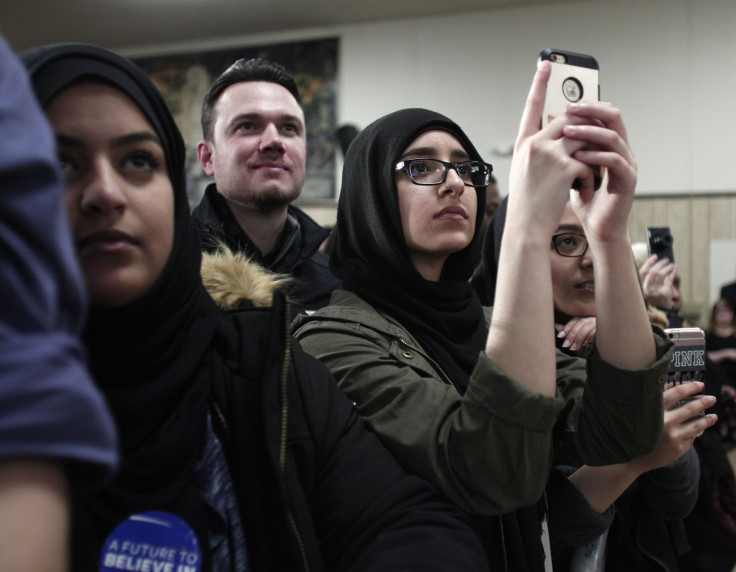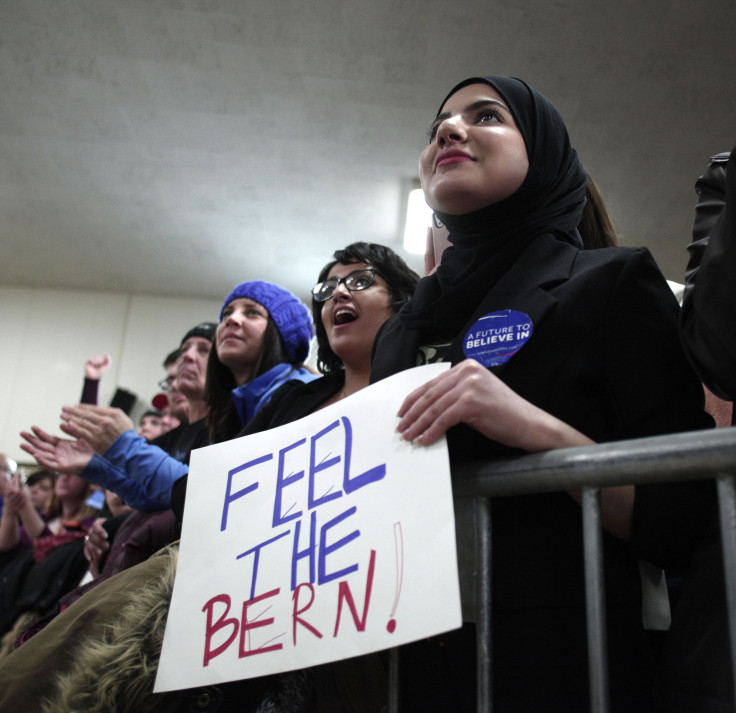Bernie Sanders Wins Big With Michigan Muslims — And Political Pundits Can’t Quite Believe It

Political commentators and media outlets were quick to pounce on a “fascinating” statistic from Bernie Sanders’ victory in the Michigan primary on Tuesday night: Democrats in Dearborn, a city whose population is 40 percent Arab, voted overwhelmingly for Sanders over rival Hillary Clinton (59 percent to 39 percent). The subtext of pointing out this particular statistic is clear. How, the media wondered, could a predominantly Muslim group support a Jewish candidate?
As the results rolled in, television pundits like Lawrence O’Donnell and Chuck Todd marveled on MSNBC that Sanders was doing so well in Dearborn “despite” the large Arab-American population there. WNYC radio host Brian Lehrer tweeted that Sanders’ dominance in Dearborn was “the stat of the night,” later adding “It’s official: Arab city feels the Jewish Bern.” Meanwhile, The Week dubbed it “just one more strange data point in an election overflowing with them.”
Another example of assumed Arab anti-semitism. Purblind. Offensive. https://t.co/vgAgV1DUDe
— ChristineKaratnytsky (@ckaratnytsky) March 9, 2016
The assumption implicit in such commentary, of course, is that Muslims are biased against Jews — and that when they do cast a vote for Jewish candidates, it’s because they’ve somehow managed to overcome their own inherent anti-Semitism. But this fascination with Dearborn’s support of Sanders actually demonstrates the media industry’s own all-too-prevalent prejudice — and reveals how much reporting on American Muslims is still rooted in an unsophisticated naiveté about what motivates them.

“It’s no surprise that the mainstream media ... is guilty of promoting two-dimensional caricatures of Muslims and Arabs,” said Hend Amry, a Libyan-American writer who frequently comments on social issues related to Muslims. “I tweeted that the media is shocked that Dearborn residents didn't announce an ‘intifada’ against Jewish Bernie Sanders to point out this very stereotype.”
Khaled Beydoun, a law professor who specializes in Arab populations, wrote that “the ‘Muslims voting for a Jew’ tagline is trite,” adding that Muslims in Michigan were supporting Sanders because of his progressive politics and outreach.
Standing against Islamophobia resonated strongly with Muslim American voters in #MichiganPrimary. #FeelTheBern pic.twitter.com/2Vb1eVVpYZ
— Khaled Beydoun (@KhaledBeydoun) March 9, 2016
Indeed, the Sanders campaign has focused on courting the Arab population in Dearborn, especially in the last week. (While most Arab-Americans in the area are Muslims, not all are — there is also a sizable Chaldean, or Iraqi Catholic, community.) He met with Arab-American leaders in the city, released an Arab-language radio ad in the Dearborn market, and reiterated at a Dearborn campaign rally that “we’re going to end bigotry in this country once and for all.” It’s hardly a new theme in Sanders’ campaign — he has spoken out against anti-Muslim rhetoric for months, likening such prejudice to the conditions his Jewish parents faced preceding the Holocaust.
“Arabs, both Muslim and Christian, have long been targets of discriminatory anti-terrorism policies, and Sanders’ campaign has responded to these concerns better than anyone else. He even promoted his campaign platform of equality and dignity in Arabic,” said Amry. “We are also seeing, perhaps, a response to the Sanders’ campaign’s attack of corporate America. Michigan’s blue-collar Arab Americans are suffering economic challenges too, not just white blue-collar Americans.”
Those economic challenges were some of the reasons Muslim voters in Michigan said they were pulling the lever for Sanders. Shiab Mussad, a 22-year-old recent college graduate from Dearborn, told the Detroit Free Press that he was impressed with Sanders’ passion about making college more affordable. He added that Sanders’ faith was not under consideration when he was deciding his vote.
“He has a good foreign policy record,” said Mussad. “I support him because of his policies, not because of ... his personal religion.”
is it perhaps possible....maybe.....there exists no inherent enmity between arabs & jews. maybe.......maybe that's a racist presupposition
— Tasbeeh (@THerwees) March 9, 2016
© Copyright IBTimes 2025. All rights reserved.





















